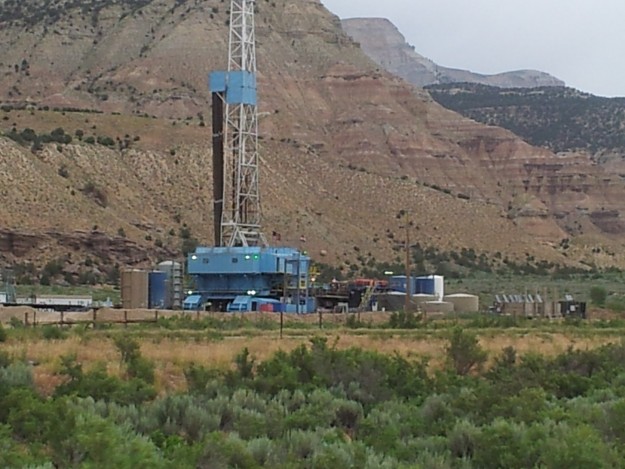Widgetized Section
Go to Admin » Appearance » Widgets » and move Gabfire Widget: Social into that MastheadOverlay zone
Colorado Supreme Court to decide two cases stemming from fracking ban lawsuits
Editor’s note: A version of this story first ran in The Colorado Statesman. Another story on the topic ran on www.routefifty.com.
The Colorado Supreme Court last week agreed to decide two citizen-driven anti-fracking cases that will go a long way toward determining the future of oil and gas drilling across Colorado.
In both cases – a five-year moratorium on fracking imposed by Fort Collins and an outright fracking ban in Longmont – industry and state officials contend that Colorado law preempts local regulations limiting drilling operations.
Gov. John Hickenlooper, speaking Tuesday on KRCC (91.5 FM) in Colorado Springs, said he thinks the state’s high court will side with mineral-rights owners.
“I expect they will recognize that people’s private property can’t be taken by government without some kind of compensation,” Hickenlooper said. “If Longmont or Fort Collins want to ban fracking permanently or for a period of time, the people that have reserves should be compensated, just like if government takes someone’s land and they want to put a road on it.”
That kind of finding by the Supreme Court will not be popular with citizen “fracktivists” who for years have been trying to ban the process, which injects millions of gallons of water, sand and chemicals under high pressure deep into oil and gas wells to force up more hydrocarbons.
“I don’t get to appoint the Supreme Court, but it’s also a ‘taking’ to force fracking down the throats of home-owning citizens, thereby taking their property values, health, safety, and quality of life,” said Fort Collins environmental activist Gary Wockner, who adds that Hickenlooper should not be telling his own Supreme Court appointees how they should rule.
Fort Collins passed its five-year moratorium in 2013, and Longmont in 2012 imposed an outright ban on fracking, which is utilized in approximately 90 percent of oil and gas wells. The Colorado Oil and Gas Association (COGA), an industry trade group, sued in both cases, and got favorable lower-court rulings. The cities then appealed to the Colorado Court of Appeals.
COGA director of policy and external affairs Doug Flanders says the Supreme Court in the past has sided with the industry and the state on this topic.
“We look forward to once again having the Supreme Court put further clarification that the ban implemented in Longmont and that the Fort Collin’s moratorium are preempted by current law and are thus illegal,” Flanders said in a prepared statement. “However, just like before, we will continue to do the difficult and unsexy work of finding reasonable and workable solutions with our friends and neighbors throughout the state.”
The state and its chief oil and gas regulatory agency, the Colorado Oil and Gas Conservation Commission (COGCC), has been a party to legal action over Longmont’s more stringent drilling regulations, although it dropped that suit at Hickenlooper’s urging and convinced COGA to do the same. However, the fracking ban remained in place.
“Any city or town that tries to keep oil and gas at bay gets sued,” said Coloradans Against Fracking spokeswoman Karen Dike.” I live in Longmont and we didn’t want the oil and gas here, and so the governor and the industry are suing us.”
Dike’s coalition of 40 citizen-activist groups is once again weighing a ballot question seeking to ban fracking statewide in November of 2016.
“Anything that is done to try and decrease the amount of oil and gas or to have any say in where it is is met with resistance,” Dike added, “and [COGCC Director Matt] Lepore basically said that where wells are sited is ultimately up to COGCC, and so far COGCC reads their mission as being to promote the oil and gas industry.”
Lepore’s agency is on the cusp of releasing draft local-control rules that will require oil and gas companies to register with towns and begin discussions on where to local drilling operations well in advance of seeking state permits. The new rules will also define what constitutes a major drilling facility, which will be a key trigger in requiring local input.
The draft rules, now expected to be released this week, stemmed from the governor’s Oil and Gas Task Force, which was set up in the wake of a deal that pulled two controversial local-control questions off the 2014 ballot.
“There’s a spectrum of thoughts and opinions within even the various stakeholder groups,” Lepore told The Statesman. “Not all of the local jurisdictions see things exactly the same way, and that was certainly one of the lessons of the governor’s task force. There’s a range of feeling about how oil and gas integrates into these communities, or doesn’t in some cases.”
Colorado has some of the toughest oil and gas regulations in the nation, including recognizing methane as a pollutant and requiring disclosure of chemicals used in fracking.
David O. Williams
Latest posts by David O. Williams (see all)
- In governor’s primary race, Bennet, Weiser sparring over who is tougher on Trump - July 15, 2025
- The O. Zone: Battle for public lands just now heating up, much like our atmosphere - July 14, 2025
- Immigrant rights groups push Colorado AG Weiser for probes into violations of ICE collaboration law - July 11, 2025



